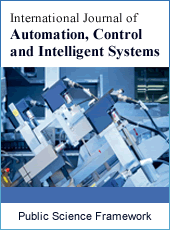International Journal of Automation, Control and Intelligent Systems
Articles Information
International Journal of Automation, Control and Intelligent Systems, Vol.1, No.4, Nov. 2015, Pub. Date: Nov. 19, 2015
Adaptive Locomotion Control System for Modular Robots
Pages: 92-96 Views: 3035 Downloads: 1403
[01]
Demin Alexander, Institute of Informatics Systems, Siberian Branch, Russian Academy of Sciences, Novosibirsk, Russia.
This paper proposes a learning control system for modular robots with many degrees of freedom. The system is based on cooperative module training, from discovering common monitor rules for all the modules to their subsequent specification in accordance with semantic probabilistic inference approach. Using an interactive 3D-simulator, a series of successful experiments was conducted in teaching the models of snake-like and multiped robots. The results of experiments have shown that the proposed control system model is quite effective and can be used to control complex modular systems with many degrees of freedom.
Control System, Pattern Recognition, Knowledge Discovery, Data Mining
[01]
Yim M.H., Duff D.G., Roufas K.D. Modular reconfigurable robots, an approach to urban search and rescue // 1st International Workshop on Human Welfare Robotics Systems (HWRS2000). – 2000. – pp. 19-20.
[02]
Stoy K., Brandt D., Christensen D.J. Self-Reconfigurable robots: an introduction // Intelligent robotics and autonomous agents series. – MIT Press, 2010. – 216 p.
[03]
Kamimura A., Kurokawa H., Yoshida E., Tomita K., Murata S., Kokaji S. Automatic locomotion pattern generation for modular robots // Proceedings of 2003 IEEE International Conference on Robotics and Automation. – 2003. – pp. 714-720.
[04]
Ito K., Matsuno F. Control of hyper-redundant robot using QDSEGA // Proceedings of the 41st SICE Annual Conference (2002). – 2002. – V. 3. – pp. 1499-1504.
[05]
Marbach D., Ijspeert A.J. Co-evolution of configuration and control for homogenous modular robots // Proceedings of the eighth conference on Intelligent Autonomous Systems (IAS8). – IOS Press, 2004. – pp. 712-719.
[06]
Tanev I., Ray T., Buller A. Automated Evolutionary Design, Robustness and Adaptation of Sidewinding Locomotion of Simulated Snake-like Robot // IEEE Transactions on Robotics. – V.21. – N. 4. – August 2005. – pp. 632-645.
[07]
Smith R. Open Dynamics Engine. – URL: http://ode.org/.
[08]
Vityaev E.E. The logic of prediction. In: Mathematical Logic in Asia. Proceedings of the 9th Asian Logic Conference (August 16-19, 2005, Novosibirsk, Russia), edited by S.S. Goncharov, R. Downey, H. Ono, World Scientific, Singapore, 2006, pp.263-276.
[09]
Vityaev E.E. A formal model of neuron that provides consistent predictions // Biologically Inspired Cognitive Architectures 2012. Proceedings of the Third Annual Meeting of the BICA Society (A. Chella, R.Pirrone, R. Sorbello, K.R. Johannsdottir, Eds). In Advances in Intelligent Systems and Computing, v.196, Springer: Heidelberg, New York, Dordrecht, London. 2013, pp. 339-344.
[10]
Vityaev E.E., Demin A.V. Recursive subgoals discovery based on the Functional Systems Theory // Frontiers in Artificial Intelligence and Applications. 2011. V. 233. p. 425-430.
[11]
Demin A.V. Logical Model of the Adaptive Control System Based on Functional Systems Theory // Young Scientist USA. Applied science. – Auburn, Washington, 2014. – pp. 113-118.
[12]
Demin A.V., Vityaev E.E. Learning in a virtual model of the C. elegans nematode for locomotion and chemotaxis // Biologically Inspired Cognitive Architectures (2014). – Elsevier, 2014. – V. 7. – pp. 9-14.

ISSN Print: 2381-7526
ISSN Online: 2381-7534
Current Issue:
Vol. 4, Issue 4, December Submit a Manuscript Join Editorial Board Join Reviewer Team
ISSN Online: 2381-7534
Current Issue:
Vol. 4, Issue 4, December Submit a Manuscript Join Editorial Board Join Reviewer Team
| About This Journal |
| All Issues |
| Open Access |
| Indexing |
| Payment Information |
| Author Guidelines |
| Review Process |
| Publication Ethics |
| Editorial Board |
| Peer Reviewers |


